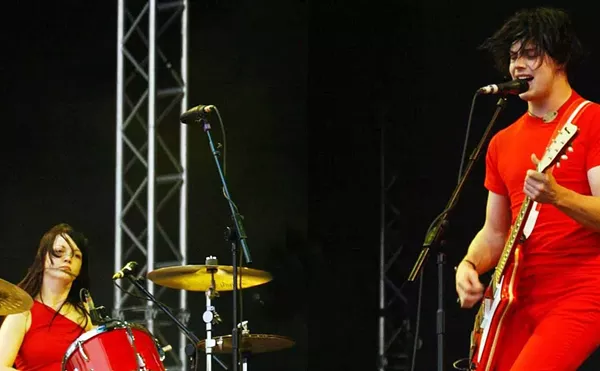
Audio By Carbonatix
[
{
"name": "GPT - Leaderboard - Inline - Content",
"component": "35519556",
"insertPoint": "5th",
"startingPoint": "3",
"requiredCountToDisplay": "3",
"maxInsertions": 100,
"adList": [
{
"adPreset": "LeaderboardInline"
}
]
}
]
All of those impressive accomplishments might not have been had not sibling rivalry intervened at a young age.
"My younger brother Dwayne played the saxophone and my grandmother, who raised us, used to call all her friends and brag about how good her grandson who played the saxophone sounded. And, of course, I became envious," Adams confesses.
But his jealousy toward his brother didn't fester into a bitter rivalry. Rather, they both joined their uncle's R&B band. Adams says they had a good sound together and he thought they were good enough to be the next Brecker brothers, or as accomplished as Wynton and Branford Marsalis. He credits his uncle, who was always buying records and rehearsing, with whetting his interest in music. But when his brother quit playing, Adams was uncertain about his ability to make a living playing the trumpet.
"At the time I was seriously thinking about playing music, Wynton had come on the scene and I was listening to other young cats like Terrance Blanchard. I thought that I never was going to be that good. I had a day job and I knew it took practice to play on their level. I didn't have the time to practice like that, so it wasn't any use of me even trying," he recalls.
He shelved his trumpet and got a job in a men's clothing store, working there for five years. But although he stopped playing, he never abandoned his love for music. He would pick up his trumpet, blow a few notes and try to copy some solos from his favorite players, such as Freddie Hubbard and Chet Baker. Still he wasn't thinking of ever returning to playing full time.
Then Adams started going to the sessions at Alvin's Bar on Monday nights. He jammed with the likes of trumpeter Marcus Belgrave and saxophonists Larry Smith and James Carter.
"Man, going to that jam session on Mondays was a big help to me because, of course, that's part of the learning process, just to play on the stage. In fact, that was a big part, having the sessions as a vehicle to motivate me to practice, and being around all my peers," he says.
The transition back into music wasn't easy.
For a while, after the clothing store went out of business, he collected unemployment and played a few gigs, but his chops weren't strong enough to sustain a living. Plus, he admits he didn't have a grasp of the jazz language.
Next Adams joined pianist and composer Teddy Harris' New Breed Be Bop Orchestra. He met Harris, whom he cites as one of his major influences, at a summer youth program at Northwestern High School.
"When I started playing with him, I didn't know anything about jazz. I mean I was listening, but I didn't know what to play. I didn't know that language. Just being around that type of environment and playing his charts gave me an idea of the language of jazz.
"By the end of the summer, Teddy decided to start a band with some of the guys from the summer program, which I thought was great because I was about to start playing with the big boys." For several years, Harris' New Breed Be Bop Society Orchestra was like a musical university to Adams. He developed his chops and became one of the most talked-about trumpet players on the Detroit jazz scene.
Although Harris taught him the jazz idiom, Adams still felt something was missing from his playing. He didn't discover what it was until he started playing with Johnnie Bassett & the Blues Insurgents. In Bassett's band, he learned a new language, the blues.
"I recommend that anybody who wants to play jazz first learn how to play the blues. That did a lot for my playing. Hearing Johnnie every night gave me more of a basis to build on what I'm trying to do as far as playing straight ahead.
"The blues is the basis. It's a different language, but it all coincides with the history of jazz. I had it in my heart, but I didn't have it under my fingertips as far as with my trumpet," Adams says.
He believes the biggest challenge now is incorporating the blues into everything that he plays. "Even if I play 'Tea for Two,' you will hear the blues in it."
On stage, Adams successfully fuses the blues with hard bop and a tinge of swing. This amalgam of genres makes it hard to lump him into any one category. He's too versatile, crafting his solos with delicacy and precision.
One minute he plays as soft and delicate as snow melting on cotton, which immediately brings to mind the late trumpeter Johnny Coles. Then he switches to a style reminiscent of some of the progressive hard boppers of the '50s, that is as rough and straight ahead as an excavator cutting through the earth.
If you listen to Adams closely enough, you'll hear a style emerging that's deeply rooted in the major musical forms that make up black music, but served up in a way that only a jazz musician could. His music has shed its baby fat and is developing the form of maturity.
At this weekend's gig, Adams and renowned drummer Hammond will be joined by Wendell Harrison on saxophone and clarinet and Tasilli Bonds on bass.
Whether playing as a sideman or a leader, Adams knows that making jazz takes a collective effort. He understands that the group as a whole makes the music swing.
In fact, to listen to Dwight Adams is to experience swing, the blues and hard bop all rolled up together. Charles L. Latimer writes about jazz for Metro Times. Send comments to letters@metrotimes.com





